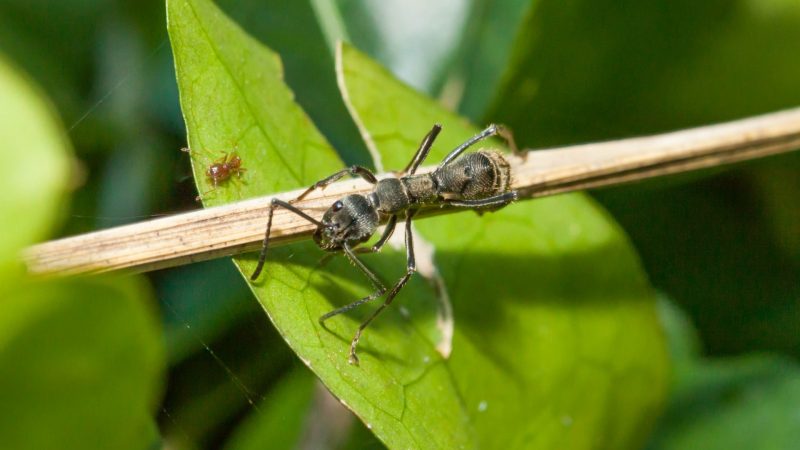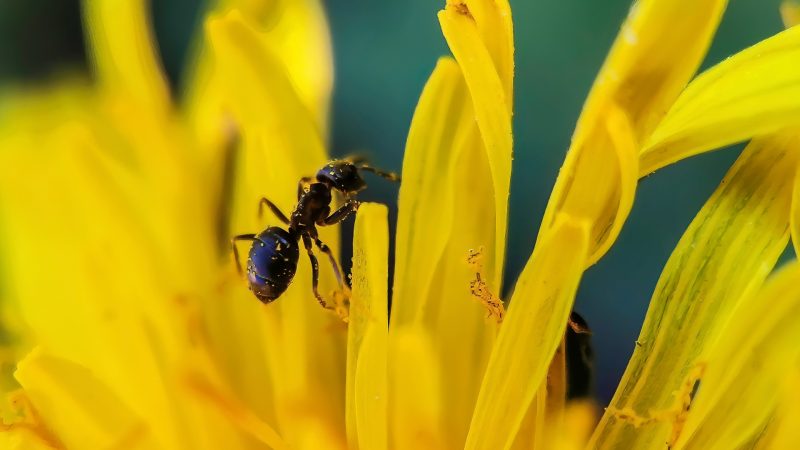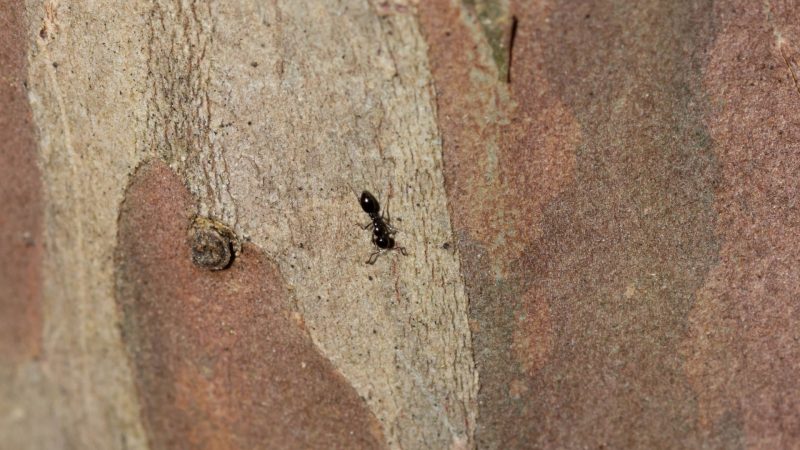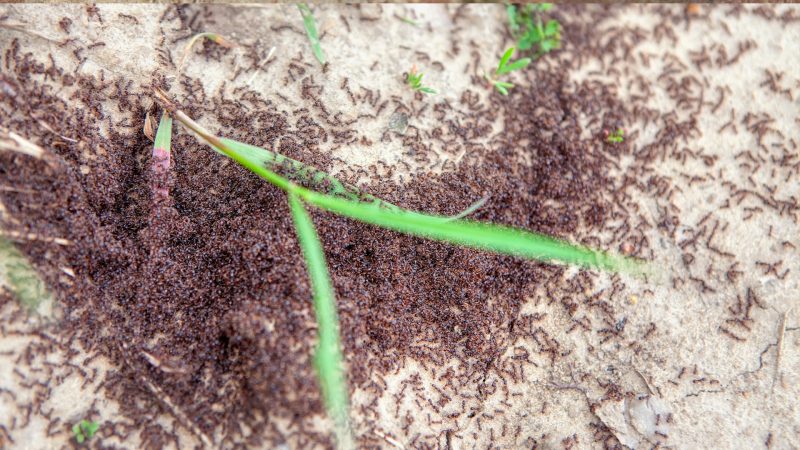Little black ants are social insects that live in large colonies. They’re nuisances when they invade your home for food and nest in your walls.
So, what are the natural ways to get rid of little black ants? Some of the natural ways to get rid of ants involve the use of diatomaceous earth and pepper. Just sprinkle any of these two into the affected area. In addition, you may also use peppermint, tea tree oil, and dish soap. Just fill some water into a spray bottle, mix it with essential oil or dish soap, and spray it on them.
The stated remedies above are only a part of the possible solutions you can use in dealing with black ants.
What Are Little Black Ants?

Little black ants are social insects that live in large colonies. They’re most prevalent in rotting logs and can also be found under rocks and piles of lumber or bricks.
Once they enter your home, they’ll nest in places like wall voids, behind facades, woodwork, and decaying wood or masonry. Little back ants are about 1/16 of an inch and are typically jet-black in color.
They live in large colonies, comprising 2,000 workers and several queens. Additionally, they scavenge for food in trails and are typically attracted to sweets, greases, and meats. They’re usually seen scavenging for food in long trails on the sidewalk of your property or kitchen cabinets.
How Do You Identify Little Black Ants?
You can recognize black ants with their dark brown or jet-black color. They are about 1/16 of an inch in length and have a round, asymmetrical shape.
These minuscule insects have uneven, round thorax and antennae that are divided into twelve segments. In addition, they possess two nodes on the petiole. They’re also pretty small and have a shiny appearance, compared to other ant species that are dull.
Related: Do Dead Ants Attract More Ants? | The Play-Dead Phenomenon!
What Do Little Black Ants Eat?

These ants are omnivorous and typically feed on:
- Honeydew
- Insects
- Corn meals
- Vegetables
- Oily foods
- Plant secretions
- Sweets
Where Can You Find Little Black Ants?

You can usually find them in dark and hidden spots. Outdoors, you may see the worker ants forage in trails, typically along the foundation walls or sidewalks.
Indoors they can be found in wooden items, walls, and the junction between the walls and carpet.
How Did These Little Black Ants Get Into Your Home?
Little black ants get into your home through the home’s foundation and cracks in your pavement. They usually go indoors in search of moisture and food.
This may result in an infestation when your food items are improperly stored. Thus, make sure your foods are kept in a tight container to prevent encouraging these ants from returning to your place.
It’s also best to repair the cracks and holes in your place to ensure they have a lesser point of entry. When you notice some ants in your house, it’s best to scan your property ahead for infestation. This may have come from outdoors or could be indoors.
Thus, take time to inspect your place to avoid severe infestation on your property.
Related: How To Get Rid Of Ants Without Killing Them | Humane Remedies!
What Damage Do Little Black Ants Cause?

In general, little black ants don’t cause severe damage to your property. However, they can create jagged patches and holes in the turf by moving the soil beneath.
Furthermore, once they go inside your property, they can contaminate your food. Ants can carry food-borne diseases, such as salmonella, that can affect human health in general.
How Serious Is a Little Black Ant Problem?
The little black ant isn’t as dangerous as red ants or carpenter ants that can ruin structures. However, they can be a nuisance once they enter your home and contaminate your food.
In general, ants carry food-borne diseases, such as salmonella, shigella, clostridium, E. coli, various fungi, and more. Thus, it’s still best to get rid of the little black ants once you find them in your house.
How to Get Rid of Little Black Ants?
To get rid of these black ants, you may opt for natural ways or chemical methods. You may also call for a local pest control expert to inspect your place and solve the ant problem for you.
If you want to treat the black ants yourself, you may consider the following methods:
Use Chemical Products
For chemical methods, many available products in the market kill ants effectively. But, you have to choose the one that wouldn’t harm your kids or pets.
Read the label of the product if it’s family and pet safe. Some examples of these chemical products are the TERRO Ant Bait Plus and Ortho Home Defense Killer .
- Attracts & Kills - These granules bait and kill ants,...
- Long Lasting - The weather-resistant granules provide...
- Keeps Insects Out - These outdoor granules take care of insect...
- Easy to Use - The convenient 2 lb shaker canister allows for easy...
- For Outdoor Use - Ideal for use as a perimeter application around...
- Ortho Home Defense Insect Killer for Indoor & Perimeter2 is a bug...
- Provides a long-lasting bug barrier of up to 12 month protection...
- Apply this pesticide anytime as a preventative treatment or after...
- Use this pest control spray with confidence indoors (kitchens,...
- The easy-to-use continuous spray Comfort Wand helps you control...
The Use of Natural Means
One of the best ways to get rid of ants is the use of . Borax has a component that acts as a poison when ingested. This damages the digestive system of ants, killing them in the process.
Just mix borax with sweet things, such as syrup and sugar, and you’ll have your effective bait. In addition, coffee grounds, boiling water, and cornstarch are also great options for getting rid of your black ants’ dilemma.
Moreover, you may also opt for herbs and spices, essential oils, vinegar, and chalk. These are great items for deterring ants from invading your space.
So, whenever you face these ant types, you may use these natural means to eliminate them. To know further about natural means, you may continue reading the given remedies below.
Related: How to Get Rid of Black Ants: A Complete Guide
How to Get Rid of Little Black Ants Naturally?
To eliminate little black ants naturally, you may consider using the following:
Borax
When consumed, borax acts as a slow-acting poison, damaging the digestive systems of ants. This is then passed to a larger ant population, resulting in the death of many ants.
Just mix equal parts of borax and sugar or syrup and put the mix where ants can easily find it. However, make sure that your children or pets won’t reach it, as this can still be toxic.
Related: How to Get Rid of Ants with Borax: A Complete Guide
Diatomaceous Earth (DE)
Diatomaceous Earth is another way of getting rid of black ants. This is composed of diatoms—the aquatic organisms’ fossilized remains.
This works by sprinkling DE on ants, which absorbs the oils in their exoskeleton, drying them out. Its component is an irritant to avoid breathing it or letting it contact your skin.
- Natural Product - Composed of 2lbs of 100% ground freshwater...
- OMRI Listed - Listed with the Organic Minerals Research...
- Powder Duster Included - Powder duster in the bag for easy and...
- Supports a Great Cause - Harris donates 10% of profits to support...
- Made in the USA – Mined in Nevada and packaged in Georgia
Peppermint Oil
Peppermint oil is one of the best oils you can use to discourage ants from invading your place. Just fill the mixing bowl with 2 cups of water and blend in at least 10 to 20 drops of peppermint oil.
Spray the mixture around your windows and baseboards and let it dry. Ensure that your pets aren’t exposed to this solution as they can get sick of it, particularly cats.
- 100% Pure & Natural Peppermint Essential Oil - Artizen Essential...
- Ideal for Aromatherapy, Candle & Soap Making: Add a few drops of...
- Most 4 Ounce Peppermint Oils Contain Less Than 1/3 Natural Oil -...
- Glass Bottles with Eyedropper - Our high-quality glass bottles...
- Seeking Calm? Relax with Artizen - We create the perfect...
Boiling Water
This is one of the most straightforward methods of killing ants. Just boil some water and pour it directly into the holes near your home where ants are nesting.
This method is effective in killing many ants, but this wouldn’t wipe out the entire colony. Thus, make sure to pour hot water into every ant’s hole you see.
Cinnamon Leaf Essential Oil
Another option you have is cinnamon leaf essential oil . This oil contains compounds such as trans-cinnamaldehyde that are proven effective in repelling ants.
To apply this, soak cotton balls with cinnamon leaf essential oil and place them where ants can easily find them.
- 100% PURE & NATURAL CINNAMON LEAF OIL - Majestic Pure Blends oils...
- PREMIUM GRADE & QUALITY – All Majestic Pure Blends Essential...
- HIGH QUALITY GLASS BOTTLE – Our Essential Oil comes in an amber...
- CINNAMON OIL BLENDS WELL WITH – Basil, Cajeput, Cedarwood,...
- BOTTLED – Our oils are sourced from the best regions all over...
Related: Essential Oils for Ants: What Essential Oil Gets Rid of Ants?
Boric Acid
Boric acid is proven effective in killing worker ants and their queens after three weeks of exposure. This erodes their stomachs and outer shells, which kill them in the process.
However, you must take extra precautions in using this product as this is a type of poison. Make sure that pets and children won’t have access to the treated area to ensure their safety.
Furthermore, you have to wear gloves while executing the treatment. To make the solution:
Step 1: Prepare 1 cup of warm water, 1/2 teaspoon of boric acid, and 8 teaspoons of sugar. Then, mix them all together.
Step 2: Stir until the boric acid and sugar are dissolved completely.
Step 3: Once done, soak cotton balls with the solution and put them on the grounds of your home, where ants are frequent.
Boric acid can also be used as a DIY ant trap by mixing the powder with corn syrup or other sweets that attracts ants. Place the bait in the cardboard and put it in areas where ants are typically seen.
Related: Does Boric Acid Kill Ants? | A Detailed Guide
Cornstarch
With the use of cornstarch , you can choke the ants. Just apply a liberal amount of cornstarch directly on the black ants and add some water on the top.
This will suffocate and drown the ants, leading to their demise.
Related: How to Get Rid of Ants Naturally: A Complete Guide
How Do You Prevent Little Black Ants?
To prevent having little black ants on your property, consider doing the following:
- Remove open sources of foods and store your foods in a tightly covered container. As much as possible, never leave any food on the countertops as this can attract ants to your place.
- Examine your place for cracks and gaps. Once you find them, caulk them to eliminate entry areas.
- Make sure to put your pet food in heavy-duty plastic containers and never leave them longer than needed.
- Clean up the spills and crumbs in your kitchen right away and throw out your trash regularly and properly.
These prevention tips can help you reduce ant infestation within your property while working on eliminating the whole issue.
Related: How to Get Rid of Ants | Ultimate Guide
List of Sources
Halcón, L. How Do I Choose and Use Essential Oils? University of Minnesota.
Little Black Ant, Monomorium minimum. Texas A&M University.
Alder, P., Waldvogel, M. (2018). A Guide to House-Invading Ants and Their Control. NC State Extension.
- How to Get Rid of Copperheads | Practical Guide - August 27, 2023
- How to Get Rid of Corn Snakes | What Makes Them Aggressive? - August 27, 2023
- How to Get Rid of Alligators | Safety Measures and Removal Methods - July 16, 2023






